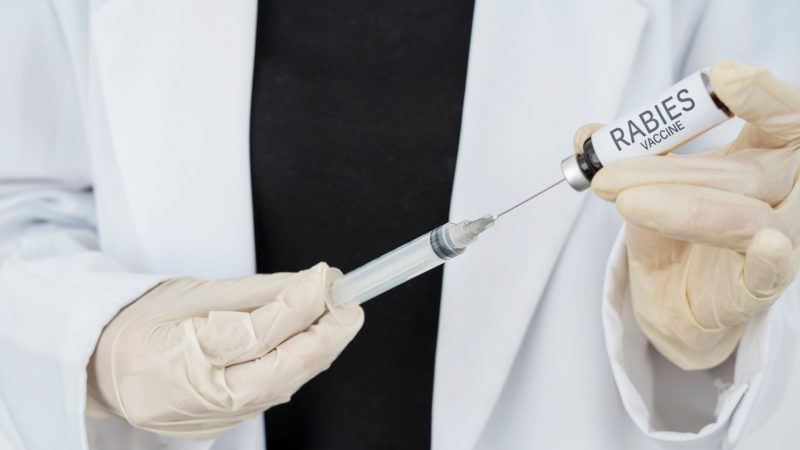Rabies, a virus that spreads through bites and scratches, can be fatal if left untreated. According to the Centers for Disease Control and Prevention (CDC), bites from infected dogs are the leading cause of rabies-related death in humans. But could other animals, like rats, also carry and spread this virus?
Do rats carry rabies? Rats, like most rodents, can carry the rabies virus. However, there’s no evidence of rats transmitting rabies to humans. Even so, these agile creatures are dangerous because they spread the “Black Creek Canal hantavirus,” the “lymphocytic choriomeningitis virus,” and the “Lassa virus,” too.
Rats and mice can be found in nearly every country in the world. If you live in an area with a large rat population (and they’re potential rabies carriers), you may need to take extra precautions to protect yourself from the virus. Keep reading to find out whether or not these rodents carry rabies.
Do Rats Have Rabies?

Rats can have rabies. In fact, any type of mammal can have rabies. However, that doesn’t necessarily mean rats are notable rabies spreaders or a major rabies threat to humans.
The Centers for Disease Control and Prevention have noted that small rodents, including rats, “are rarely found to be infected with rabies and have not been known to transmit rabies to humans.”
Do All Rats Carry Rabies?

Not all rats carry rabies, and according to the current cumulative data gathered on wild rats, very few rats carry rabies. Of course, that doesn’t mean rats can’t have rabies. It’s just that they’re not common carriers.
There are zero recorded cases of a rabies-infected rat transmitting the rabies virus to a human. Though all mammals can catch rabies, small rodents aren’t at significant risk of carrying and spreading the illness.
When you consider how rabies is transmitted and spread, it makes logical sense that rats would be unlikely carriers. Rabies is spread through bites or scratches, and dogs are some of the most widespread carriers.
Rats, relatively small mammals, wouldn’t likely survive an attack from a predator infected with rabies. This low survivability rate would prevent the rat from spreading the virus to other rats or mammals.
Can Rats Get Rabies?

Rats can get rabies, although the chance of a wild rat population becoming infected with rabies is relatively small. Rats, and all other mammals, can catch and spread the rabies virus.
Still, it’s crucial to consider how rats behave and how that might influence their susceptibility to the rabies virus. After all, just because an organism can catch a virus doesn’t necessarily mean that it will.
How Do Rats Get Rabies?
Rats can catch the rabies virus if they consume an infected animal or during a fight for food, water, and territory with infected animals like skunks or raccoons. Also, a rat can catch rabies when it gets wounded, and the infected animal’s saliva then enters its bloodstream.
However, rats rarely get rabies. The predatory animals known for carrying rabies are more likely to kill a rat than simply infect it. And the other types of wild animals that are infamous for harboring the rabies virus are primarily scavengers and herbivores.
But if a rat does catch rabies from infected animals, it might turn violent against members of its colony. This could then lead to the virus spreading.
Still, a rabies-infected rat is an easy meal for a predatory animal like a fox, dog, or cat. As such, rats with rabies are potentially more dangerous to pets than they are to humans.
How To Know If a Rat Has Rabies?
Though rats don’t typically catch and transmit rabies, you should get familiarized with the symptoms of a rabies-infected rat. That way, you can tell if a rat has rabies and alert local authorities to prevent the further spread of the virus.
Rat Rabies Symptoms
One of the best ways to determine whether or not a rat has rabies is to observe them from afar. This is because some of the symptoms of rabies are quite pronounced, particularly during the later stages of infection.
A few of the most common rat rabies symptoms include:
- Difficulty in walking or climbing
- Appearing ‘drunk’ or unbalanced
- Biting its body or tail
If you spot a rat, you shouldn’t approach it. Even if it’s not exhibiting the above symptoms, it could be harboring several other illnesses and parasites.
Still, if you suspect a local wild population of carrying the rabies virus, it’s essential to contact your local pest control department and notify them. That way, they can test specimens and either confirm or deny your suspicions.
Can a Rat Bite Cause Rabies?

A rat bite can give you rabies if the animal is indeed infected. However, the chances of you getting bitten by a rat are low. Even if a pet rat has bitten you, there’s little cause for concern. That’s because most pet rats are disease-free.
But if a wild rat has bitten you, you should seek immediate medical care and guidance. Wild rats carry many viruses, and they may be infected with rabies as well.
When seeking medical attention, be sure to let the practicing nurse or physician know that the source of your bite is a wild rat so that they can administer the proper medications and vaccines to help you avoid the worst potential consequences of a rat bite.
Is a Rabies Vaccine Necessary for a Rat Bite?

A rabies vaccine is unnecessary for a rat bite unless your doctor finds that the rat is indeed infected with rabies. The chances of getting rabies from a rat bite are very low.
The Centers for Disease Control and Prevention asserts that bites from rats, “almost never require rabies treatment or vaccine.”
Can a Dog Get Rabies from Killing a Rat?

A dog can get rabies after killing a rat, but that’s unlikely. However, dogs are the most notable carriers and spreaders of rabies, so it’s crucial to have your dog tested for the virus if it has killed or interacted with a rat.
That said, a dog that has managed to kill a raccoon might be more at risk of catching the virus than a dog that has killed a rat. This is because cases of rabies in wild rats are incredibly rare.
Protecting your dog from the rabies virus starts with thoughtful outdoor playtime. If you’re letting your pup out into the yard, keep an eye on them at all times until it’s time to go inside. Then, if possible, interact with your dog using toys and treats until outdoor playtime is over.
Can Cats Get Rabies from Rats?

A cat is less likely to get rabies from rats. If your cat has killed and consumed a rat, been bitten by a rat, or gotten scratched by a rat, then you should have it tested for the rabies virus. However, it is not common for wild rats to have rabies.
If your cat has had violent interactions with a rat, it might be more crucial to have them tested for the many viral and bacterial illnesses that rats carry and spread. Parasites, hantavirus, and leptospirosis bacteria are all potential dangers of interacting with wild rats.
Keeping your cats safe from rabies and other rat-borne illnesses often starts with regular pest control services, home maintenance, and landscaping. You can also ensure that your cats remain indoors at all times.
Other Animals That Carry Rabies
Rats can carry and transmit rabies, but it rarely happens. So if you’re concerned about catching rabies from a wild animal, then rats shouldn’t be your primary focus. Other animals are far more notorious for spreading rabies.
Many wild and partially-domesticated animals are known rabies carriers. According to a study authored by Professor Muhammad Zubair Yousaf, et al., “the animals which are mainly reported as causes of rabies include dogs, raccoons, foxes, and skunks.”
Dogs are the largest source of human rabies infections in the world. But people can become infected by many other types of animals. In fact, all mammals are susceptible to the rabies virus. As such, any mammal can become a carrier or a spreader.
List of Sources
Domestic Animals. Centers for Disease Control and Prevention.
Other Wild Animals. Centers for Disease Control and Prevention.
Rabies. Centers for Disease Control and Prevention.
Yousaf, M., et al. (2012). Rabies molecular virology, diagnosis, prevention and treatment. Virology Journal.
- How to Get Rid of Copperheads | Practical Guide - August 27, 2023
- How to Get Rid of Corn Snakes | What Makes Them Aggressive? - August 27, 2023
- How to Get Rid of Alligators | Safety Measures and Removal Methods - July 16, 2023
